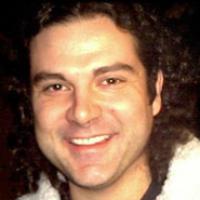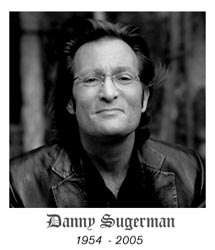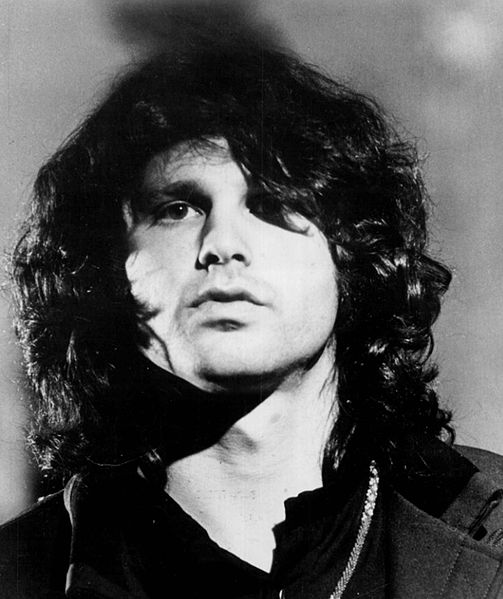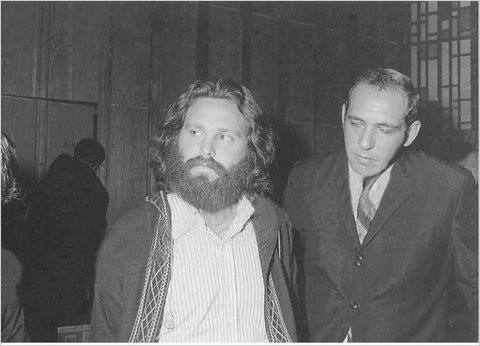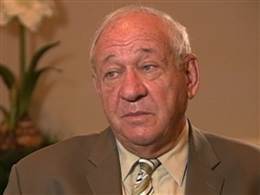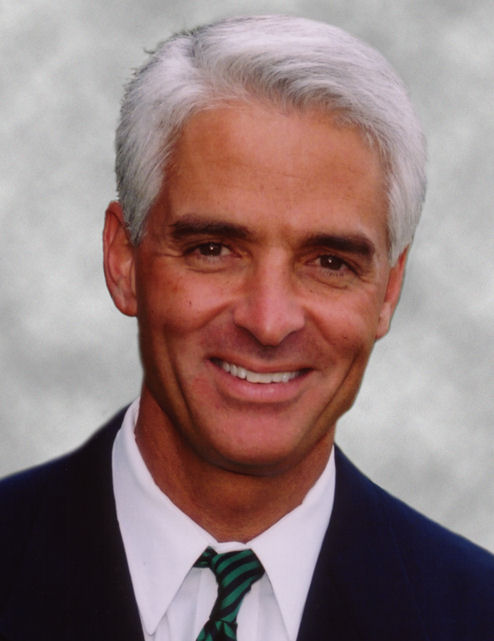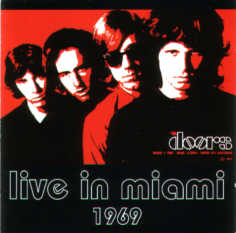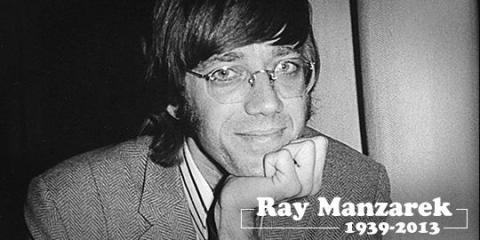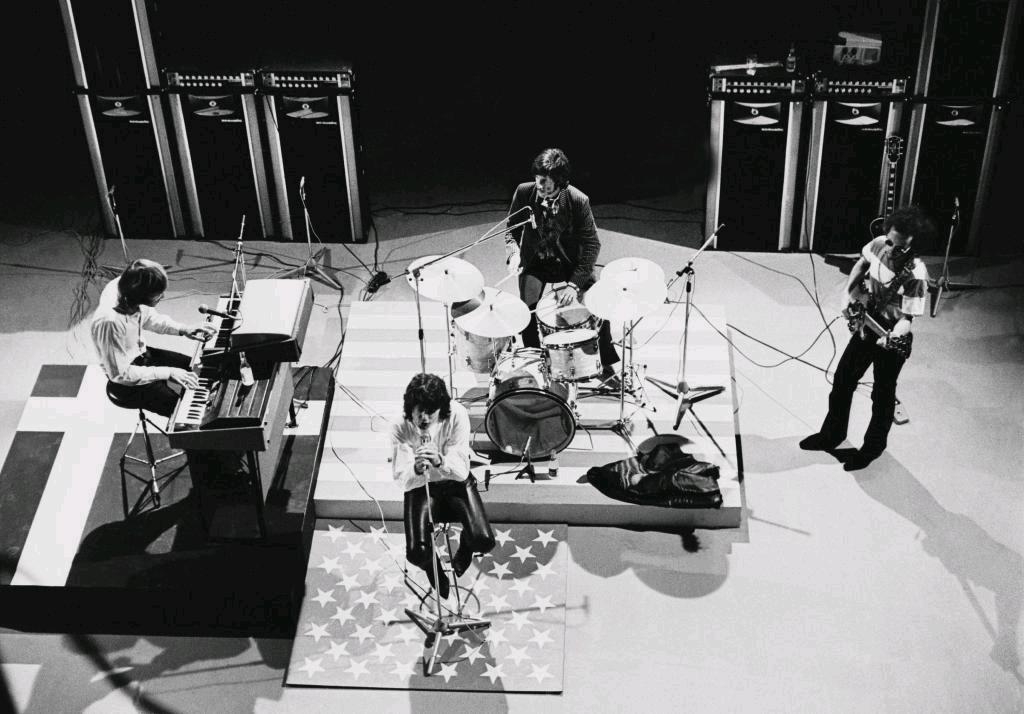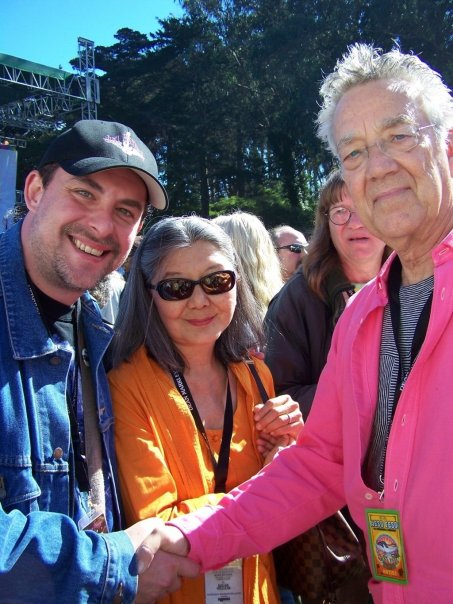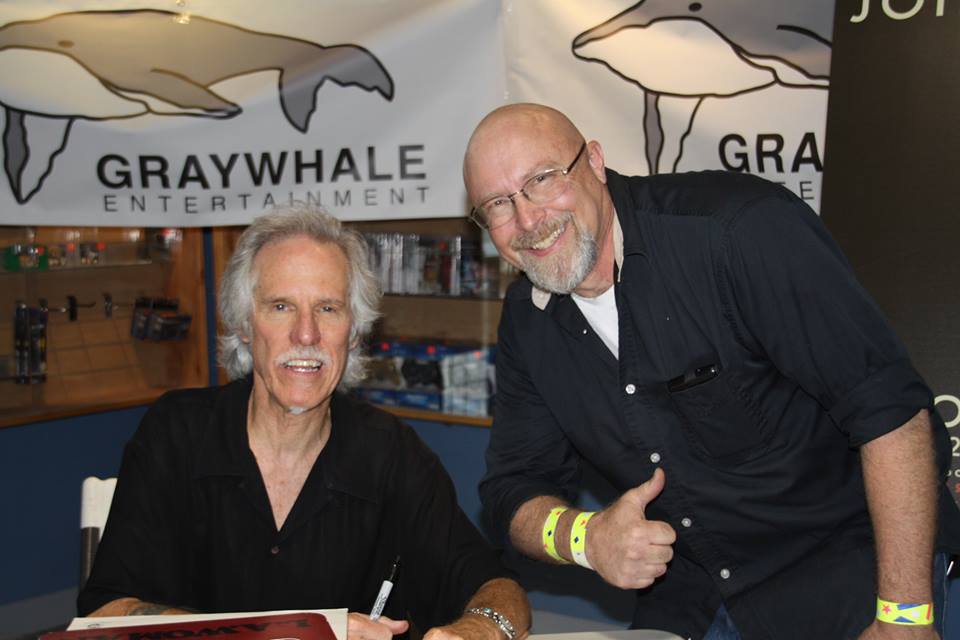A Change of Weather, A Change of Luck:
An Interview With "Wildman" Dave Diamond on the Pardoning of Jim Morrison
by
Alex R. Knight III
Back in 2000, “Wildman” Dave Diamond – a videographer, guitar aficionado and constitutional law advocate from Dayton, Ohio – had cause to contact the now late Danny Sugerman, former Doors manager and confidant, about permission to use some footage from the Doors’ infamous 1968 Live At the Hollywood Bowl performance for a public access TV presentation.
During the conversation with Sugerman, Diamond learned that deceased Doors singer and songwriter Jim Morrison’s 1970 conviction in Miami for indecent exposure and open profanity was still on the books, and that Morrison’s death in 1971 had effectively precluded any potential remedy on appeal.
Diamond also learned that a fan-based petition drive to the governor of Florida, spearheaded by Doors Collectors Magazine beginning in 1996, was the only existing movement to have Morrison’s convictions posthumously overturned or nullified.
On December 9, 2010 – one day after what would have been Morrison’s 67th birthday – Florida Governor Charlie Crist and two other members of the state clemency board, granted a full pardon, ending not only a 40 year old piece of unfinished legal business, but also a decade of Dave Diamond’s consistent personal efforts to clear Morrison’s name in the infamous Doors “Miami Incident.”
Perhaps most appropriately, on July 3, 2013 – the 42nd anniversary of Morrison’s mystery-shrouded death in Paris – Diamond contacted me, wishing to be interviewed in-depth about the fourteen year struggle to secure a full pardon for Morrison, his own ten years immersed in it, and how the process unfolded in general.
AK: You’ve been very clear all along in other interviews that you were never the architect, so to speak, of the effort to get the late Jim Morrison posthumously pardoned in Florida. What motivated you, on a personal level, to take up the mantle, as it were, and pursue this?
DD: As a longtime Doors collector, I'd always been on the lookout for various Doors live shows and videos of interest. When I discovered the Doors Collectors Magazine website sometime in 1999, I was blown away: that one stood out to me as the very best place for interested Doors fans to buy, sell, and trade Doors merchandise, as well as catch up on current Doors-related news, both past and present.
While looking over the site, I saw a link to a petition to contact various Florida officials and ask that they consider a full pardon for Jim Morrison because of the trouble that erupted after that infamous Dinner Key Auditorium concert.
I sat back and really read it over and wondered if Kerry Humphreys and his staff at Doors Collectors Magazine, who put this page together, had been making any progress on this, since I heard nothing about the effort on the news.
After reading it over that day, I totally blew it off and forgot about it -- I mean, it was of zero interest to me -- and I continued reading on, checking out other links of interest on that website.
Sometime in early 2000, some television producer friends and I were discussing ideas for television productions here in town, mainly profiling various bands that we thought would make cool presentations. Someone mentioned to me, why not a show on The Doors? The idea came about to secure a couple of videos from the Doors catalog and include those videos in some sort of talk show about the band. I thought that was a great idea, but to do that, we'd have to run it past then-Doors manager Danny Sugerman. I thought maybe he could help us out and advise further. So, I sent a small letter to Danny and asked him to contact me. A few weeks later, he did call me, but we played phone tag for a couple of days, until finally we were finally able to talk.
I told Danny we wanted to use a few song clips off the Live At The Hollywood Bowl performance and since they own that footage outright, he said not a problem. We discussed credits, which clips myself and the production crew were considering, and a few other technical issues.
Then came that part of the discussion that, looking back, seems to have changed my life forever. I asked Danny, in a non-related question, about that link on Doors.com regarding a "full pardon" of Jim Morrison. I asked him, what was that all about? Danny said some fans were trying to collect signatures to send to whoever was the governor of Florida to see if he'd consider clearing Jim's name of those charges. I was a little confused, because up until that phone call with him, I'd always assumed that the Miami matter was an open and shut case. I didn't realize there were quite a few constitutional issues and other unresolved technicalities associated with that trial.
I mentioned to Danny that if Jim died, then the case was automatically dismissed off the Florida law books, correct? He said no, Jim's Miami case had never been formally dismissed or resolved, which stunned me!
I asked Danny what happened with Jim's appeal -- Jim's lawyers were working on his appeal at the time of his death -- did that appeal go through? Again, Danny said no, nothing had been done in that regard. Everything relating to the Miami case after Jim died was just basically dropped and forgotten about.
I asked Danny for further clarification because his responses, to me, made no sense. If I understood correctly, Jim's appeal was unresolved? Danny said yes, that's correct. I asked if a motion to dismiss had ever been filed. He said there was talk about it between the lawyers when Jim died, but nothing came of it and no motion to dismiss was ever filed.
I about fell off my chair when he told me that! I told him, "Danny, if what you’re telling me is correct, then the Miami case is not over, it's not settled, there's still more work to be done." Danny said yes, he agreed and encouraged me to sign that petition on Doors.com. I told Danny it was going to take a little more than a signed petition to get a Florida governor or any other state official to consider any kind of pardon.
I told him I would definitely look into this matter a little more and see if maybe writing a few letters to some Florida officials in addition to the petition would help out. Danny responded by saying anything that I could do to help out would be greatly appreciated by the surviving band members and the Morrison family.
Then we wrapped up that call by chatting a little about his health, which wasn't the greatest up to that point. I wished him well and thanked him for the talk and that was the one and only time I ever spoke with Danny Sugerman.
I remember sitting back when I hung up with him, totally stunned regarding all this information about the disposition of Jim Morrison's Miami trial and I thought: this is wrong, this is so wrong on so many levels.
That phone call with Danny in 2000 is what officially got me interested in the Jim Morrison pardon effort. I never looked at Jim Morrison or the Miami trial the same way after that phone discussion!
AK: One would think that upon the news of Morrison’s death, filing a motion to dismiss would’ve been standard legal procedure. Was there a specific statute of limitations which made that route impossible after a certain point, as opposed to pursuing a full pardon, or even expungement?
DD: In pursuing the pardon, some consideration was explored by me with regard to 1971 Florida statutes. Assuming there was or wasn't any kind of limitation under Florida state law at that time, it was because his appeal was not formally heard or acted upon. That's where the US Constitution came into play, which trumped Florida law in this particular case.
I'm not sure, under Florida law, if a motion to dismiss and a motion to expunge would have had to have been filed separately or jointly -- neither of which was ever done. So, when it comes the application of the US Constitution, that was the only thing Jim Morrison had in his favor. As we know, the Constitution applies retroactively, in death or while still alive.
Florida's criminal and civil procedures on motions to dismiss or expunge have varied and been updated quite a bit since 1971. Trying to track down specific statutes under 1971 or 2007 guidelines became impossible, because I couldn't get clarification from Florida as to which would apply to Morrison -- the 1971 statutes as they existed at the time of his death, or the statutes as they existed in 2007 at the time his application for clemency paperwork was filled out -- once by me, and once by Doors Collectors Magazine.
AK: So the inaction of Morrison’s attorneys following his death, plus the passage of so many years, made the situation basically a legal quagmire. In contemplating the pursuit of a full pardon then, at what point did that seem preferable to seeking an expungement? Or was there ever even any such deliberation? Was expungement ever on the table as an option, and can you explain what the difference would’ve been?
DD: Yes, very early on, prior to my participation, the staff at Doors Collectors Magazine set about to find an interested pro bono attorney to explore the possibility of expunging. There were a couple of lawyers that expressed some interest, but in the end, they just very simply did not make the commitment. My personal belief is that they saw there was no money to be made in actually accomplishing this task.
Whether it was a pro bono lawyer or a regular criminal lawyer, the process of expunging is not an easy process, nor is it cheap! There would've been a cost to file any motions. There would've been court costs to be paid, as well. Plus, the Morrison blood family would've had to have been the ones to actually initiate those proceedings, and nobody was going to ask them to contemplate that sort of action.
Several of us involved would've possibly had to consider visiting Miami to attend those proceedings, and that would've meant several of us flying in from all over the country. Factor in plane tickets, hotels, driving to and from court and flying out -- all of that was money that none of us really had. The entire process of expunging proved to be way too costly, there were no lawyers who were really interested, and there were concerns over whether a judge would even call this case before the court.
Any judge would've been within their rights to not even call the case and no assurances could be given that they would, in that regard. It just didn't seem realistic that any sitting judge in Florida was going to call Morrison's case with the intentions of resolving the appeal or considering dismissal. All these factors combined, it was wise to let that process go and just stick to the pardon, which achieved basically the same results.
I thought really long and hard about all of this. I ultimately made the decision that the Morrison blood family should be left alone and that no lawyers should become involved, for the simple fact that all of the lawyers involved in the original 1970 case made mistakes left and right. I decided this was something that we should do ourselves, without the advice of counsel. That's when, officially, the pardon became the best, the last, and the only remedy left for us to pursue.
That's the one thing that's cracked me up all these years from some in the press and some Doors historians, who've suggested that expunging was the proper course to resolve this matter. Really? You're talking quite a lot of money, a lot of back-and-forth trips to Miami, the possibility that this case would not even be considered, and all other associated costs. It could take years for expunging to go through, even longer than the pardon took to accomplish and that's assuming the courts did agree to hear the case. Why put the Morrison blood family through all that again? Realistically, no one wanted to drag this Miami case back into court. It just wasn't the right course for this case. This case needed a fresh set of eyes and a sitting governor, not a judge.
Robert Josefsberg Collection
Robert Josefsberg, Jim Morrison's attorney (2010)
AK: And yet there were and are those who contend that, from a moral standpoint (Morrison’s self-proclaimed wiccan wife Patricia Kennealy
perhaps chief among them), expungement would’ve been the only appropriate resolution. Further, the argument has been made by many that in terms of public expenditures -- time and tax revenues -- the posthumous pardoning of Jim Morrison almost 40 years after his death was a gross mismanagement of both to begin with. What are your views as to these assertions?
DD: Patricia's "moral objection" to the pardon was confusing, really. How or why anyone would be against a simple legal maneuver used to restore or apply Jim Morrison's constitutional rights is beyond me -- and most others who followed this case very closely.
When Governor Crist signed Jim's pardon, several things happened. The Miami case, as we all knew it, was instantly killed from the inside out. Jim was taken back to his pre-arrest innocence, meaning everything that followed -- the trial, the verdicts, the fines, and the sentences -- instantly vanished.
In addition, as we found out after the pardon, all of the notes, journals, transcripts, any video or audio recordings made during the trial, files and other related paperwork, as well as submitted prosecution and defense evidence now belonged to the Morrison blood family and all of those items needed to be turned over.
One thing I wonder, even to this day is -- the money Jim paid in fines and court costs -- did those funds need to be refunded to the family, as well? I would imagine, with the economy the way it is these days, someone would find a "statute of limitations" on refunds! (laughs)
About a week or so after the pardon was issued, I got in touch with Miami-Dade police and asked them go into their computer files and update Jim's 1969 -1970 criminal record to reflect the changes made by the pardon. They declined and told me not without the proper paperwork, authorizations, approvals, blah, blah, blah.
I thought, you know what? I'm done with you people and the paperwork! I made a copy of Jim's entire 1969-1970 criminal record and updated it to reflect the changes made by the pardon, since it was legally binding, and posted the corrected record to my website. I was finished fooling around with Florida -- I mean, enough was enough, already, with this bureaucratic nonsense!
As for the oft-repeated opinion that the Jim Morrison pardon effort was a "waste of taxpayer time and money," that was the single most hilarious piece of criticism we received all throughout this process. At no time did we ever ask Florida for one single dime. This entire effort was self-funded by me, the staff at Doors Collectors Magazine, and several other interested Doors fans. We did all the research and made all resources available for the media and Florida officials at our own expense.
The problem with that "waste of taxpayer money" line is, not many people realized who we were -- the people behind Governor Crist's decision to take up this matter, and even today, many out there still don't know who we are. The assumption was, Governor Charlie Crist one day decided to take on Jim's Miami case just for the hell of it. That assumption kicked in, and then not many in the media bothered to verify exactly how this effort was being funded. In all fairness, though, there were indeed some reporters who did call me and who did contact Doors Collectors Magazine to inquire about the funding and we were very transparent with the media every step of the way.
All we did was work within existing public record. As I've said before, we didn't make up any new information, there was no "breaking news" to report about the original disposition of Jim's 1970 trial. All we did was ask Governor Crist and the Florida Parole & Clemency Board to resolve this open-ended case once and for all, and they did.
State of Florida archives
AK: But what about the fact that so much attention was given to the pardoning of a deceased person? Yes, Jim Morrison was a celebrity figure, and his trial and subsequent convictions were very high-profile events.
But many have asked what the point was, other than perhaps for the contentedness of the Morrison family, Jim’s former bandmates, and the Doors’ numerous fans. Did or does this pardon possess legal ramifications that go beyond Morrison’s specific case? Does it either create or nullify any legal precedents that might affect future cases of a similar nature?
DD: The point of the posthumous pardon was because Jim was denied due process at the time of his death. The US Constitution doesn't judge people based on celebrity status; it applies to all, equally. Morrison -- as shocking as this may sound to some in the press -- had rights too, and they were applied retroactively, based on a precedent that I picked up on in 2006, when the Texas appellate court ruled on the dismissal of Ken Lay's Enron case.
That's where I made the connection between the two cases. They ruled that, since Lay died before his appeal could be heard, his Enron case and ensuing convictions had to be abated. This much we know: that there is no statute of limitation on an unresolved appeal if someone dies, whether it takes forty years or four hundred years. In Ken Lay's case, his abatement was very quick -- three months after his death!
The alternative was to have done nothing and let Morrison's appeal continue to sit unresolved, which is not in line with the US Constitution. There wasn't a choice, from a legal standpoint, in the matter. It's not like Governor Crist, once made aware of this, could sit back and go, "Gee, should I or shouldn't I?" Once Morrison's unresolved appeal was presented to him, he had to fix it, in order to be compliant with Morrison's constitutional rights and expectation of due process. Otherwise, what's the point of due process?
To be honest, I wasn't happy with all of the pre-pardon hysteria in the press when Governor Crist announced in the month prior to his final clemency hearing, that yes, he would officially review the case. At the time Governor Crist made that announcement, he'd just lost his bid for the US Senate seat to Marco Rubio one week prior, in what was a pretty bitter contest between himself, Rubio, and Kendrick Meek.
Tensions were still running pretty high after that election in Florida, so there's no question that Crist's timing was really suspect by many in the press, who felt he pulled this Morrison case out of the bottom of the deck, since he knew he was on his way out. I very much feel Governor Crist's intentions to correct Morrison's case were genuine, but there was no escaping the fact that the timing of his announcement was pretty bad.
Obviously, Doors Collectors Magazine, myself, and others who were working on this case had no control over the ensuing media hysteria with regard to that announcement. I would've preferred that Governor Crist had kept all of this quiet until the day of the clemency meeting, made the pardon, and then made the official announcement afterwards.
Regardless of when Crist did make the announcement, it was at that point that I reflected over the course of my own ten year involvement – when I couldn't get any reporters interested in this effort. Now, here we were in the heart of a media blitz! It was very weird how that all worked out, from my perspective! (laughs)
The day of the pardon saw eighty-one cases, eighty living cases and one deceased case -- Morrison's. Morrison's case was number forty on the docket that day, after being moved around a few times. The meeting started at 9:00 am and Morrison's case wasn't called until around 3:15 pm, so it was a long day of waiting, that's for sure!
AK: Especially after a decade of your steady involvement in the effort, and the forty years Morrison’s convictions had already been on the books. It has been additionally suggested however, that if Jim Morrison were alive to have any say in the matter, he might not have thought the pardon was worth the effort – that, in essence, he likely would’ve thought it was just old news, and that there were other more significant aspects of his legacy that should be focused on instead. What are your reactions to this train of thought, and what do you think Morrison would think of the whole thing, if he were alive to see it?
DD: I disagree completely with all who say Morrison would've rejected the pardon if he were still alive, based on Morrison's own documented quotes to various press outlets and biographers, where he was clear in his wishes to do everything possible to get this case tossed and have those charges disappear by any means necessary. Based on my conversation with Danny Sugerman, also, there were no plans by him (Danny) or the Morrison family or the surviving band members to haul this case back to court for a dismissal. So, what was left? The pardon!
If Morrison were still alive, the pardon wouldn't have happened in the first place because, going back to 1970, he would've gone through his original appeal process, and more than likely his convictions would have been overturned. There's no doubt he would've continued working with his lawyers to proceed with dismissal of the entire Miami matter. As we know, that didn't happen.
The idea that anyone can say for sure how Morrison would feel about a pardon is pure speculation. Throughout all of our research, there are absolutely no documented quotes in print or from any audio source, where Morrison ever gave his thoughts about a pardon to anyone. I mean, realistically though, why would anyone detest a legal measure that completely kills an entire case and all of the charges, verdicts, sentences, and fines?
Several people have asked me, since the 2010 pardon, if expunging should still happen, is it still necessary, and my response is, expunge what? There's no more case, there's nothing left to expunge at this point. (laughs) As of 12/9/10, by Governor Crist's legally binding order, Jim was taken back to his pre-arrest innocence, so what is to be expunged if the case no longer exists? Which brings me back to your question: Why would anyone be against a pardon when this honored Jim's directly-quoted wishes? I think the more some skeptical people read into this, the more they'll gain a better understanding that this pardon had more power than was reported by the press.
The Morrison blood family, the surviving Doors members, and Doors fans around the world have every right to be very pleased with the pardon and it's outcome. I'm just very sorry that Danny Sugerman and Jim's father, both of whom originally offered their support for this pardon effort, were not here to see this process resolved.
AK: Let’s talk a little bit more about that. What kind of dialogue did you have, and what kind of feedback did you get, from the Morrison family, Danny Sugerman, and the surviving Doors members, throughout the duration of the pardon process? Is or was there anything confidential in that arena you’re not at liberty to discuss?
DD: Nothing confidential that wasn't already available to the public, via the press. They were all saying pretty much the same thing when this story first broke in 2007. All involved, except Danny, who passed away in 2005, offered their support. The Admiral, Jim's father, in particular, gave us a tremendous boost, as I said earlier, when he voiced his support to the Associated Press.
I did have a pair of quick meetings with the late Ray Manzarek in 2007 and 2009 in San Francisco at various Golden Gate Park musical events. During my second visit there, I had a chance to speak with Ray and Dorothy again. Ray and I chatted briefly and he asked for an update on how things were going with the pardon effort.
All I had for him at that point was, the case had been officially submitted to Governor Crist and we were all just waiting for some sort of announcement from Crist as to whether or not he would take the case for an official review. Ray told me this was all very cool news and to keep up the good work.
That was really the extent of our chat, because he had to go to the stage for his performance and I was there to cover other bands that day.
It would have been really cool to sit down with him and have a prolonged conversation about all of this, but there just wasn't enough time for either of us to do so. Looking back, Ray was very upbeat, pleasant, and cordial that day. If he was in any kind of pain from his illness, it didn't show on that day-- it was business as usual for him.
Otherwise, no, I personally never spoke directly to the Morrison blood family, Robby Krieger, or John Densmore. I'm sure though, they were all well aware through the press of what was happening as developments occurred, since the AP and other newswires were always busy getting quotes from them about the pardon effort.
As we found out later, after the pardon was issued, Ray spoke of his own conversation with Governor Crist over the whole Miami matter prior to the pardon, so we know Governor Crist had a nice talk with Ray over all of this just prior to his decision to formally accept and review the case.
I have no doubt in my mind that Ray's conversation with Governor Crist helped to convince Crist to officially bring Jim Morrison's Miami matter to a close once and for all. I mean, let's face it, Ray could be very colorful and persuasive! (laughs)
AK: Indeed he could be, and it was very sad to hear the news of Ray Manzarek’s passing on May 20th of this year. It has been many years, in turn, since Jim Morrison’s 1970 trial and conviction in Miami, and a lot of societal changes have taken place in that time. During the process, the portion of which you were involved in from 2000 to 2010, did you ever get a sense that Governor Crist’s ultimate issuance of a pardon was more easily facilitated by a change in atmosphere and public opinion from that which existed – particularly in Florida – in 1969-1970?
Or was there still a significant element of resistance or opposition to such a proposal? You have already mentioned then Governor Kirk’s remarks regarding a pardon for Morrison, all of which were substantially less than supportive. And of course there were the concerns about use of public resources you’ve already addressed. But what about more recent and wider expressions of public opinion regarding Morrison’s case througout the period from 2000-2010?
DD: There's no question that for the most part, the first generation of Doors fans have evolved and the second generation of Doors fans have evolved also, with regards to the stories of Morrison from his youth all the way through his death. Most of what we've all been hearing about with this Miami trial is "Something should've been done, it was a sham, it was a kangaroo court, Jim was railroaded, Jim was screwed" so on and so forth. The one thing that I wasn't hearing or seeing throughout all of those years up until 1996 was any kind of action.
I can appreciate all of the years of commentary, thoughts and opinions expressed by many who knew Jim, but where was the corrective action? I kept hearing this stuff about "Well, it's all part of the Morrison legend, the myth." As a Doors music consumer myself, you know what, I can play ball with that, that's all fine, well, and good.
But the question that wasn't getting answered was -- what happened to Jim's appeal? When myself and others started asking that particular question, we very simply weren't getting the right answers. Most everyone agreed, there were indeed constitutional issues associated with Jim's Miami case, but nobody was taking the action necessary to correct the record.
Overall, Florida's had a long history of some very crazy cases -- whether we're talking about 2 Live Crew, Marilyn Manson, Casey Anthony, Trayvon Martin, the Terri Schiavo matter -- and yes, the Jim Morrison Miami incident, it seems to the average person out there that Florida has a "light switch" mentality with the state laws and the US Constitution, where they turn them on and off, as they see fit.
It was very encouraging to see Luther Campbell was found not guilty and indeed, 2 Live Crew hadn't broken any obscenity laws. When did recorded music become a weapon of mass destruction? It was exactly that sort of culture the late former Florida Governor Claude Kirk created under President Richard Nixon's watchful eye that prevailed all through the 70s, 80s, and 90s. I think, by the time of the Morrison pardon, most people were just flat tired of these kinds of cases hogging up the Florida spotlight, because as one person told me years ago, these kinds of negative cases have to be killing Florida tourism.
Plus, if you’re a band or singer, why would you even consider playing in Florida with this kind of legal history, knowing that if you say or sing the wrong thing into a mic, you could possibly be arrested for every charge under the kitchen sink, like Pussy Riot was in Russia?
One of many positives coming out of Morrison's pardon is, Governor Crist made a statement that Florida does indeed, through all of the hits over the years, still have a love and respect for the First Amendment! The pardon for Jim says that he was an artist and a poet, expressing his First Amendment right to free speech and the ensuing hassles put up with after the Miami concert shouldn't have happened.
All of the governors from Kirk on through Jeb Bush had their own agendas, and obviously, fixing Jim Morrison's case and resolving his open appeal was not high priority, which is tragic, since these people take an oath to uphold that very same constitution when they become governor. With Governor Crist, we knew he was the right person to present this effort to because of his background as Florida Attorney General, and a lawyer well-schooled in the area of civil rights, constitutional law, and criminal justice.
Governor Crist's adopted philosophy was that of his predecessor Bob Butterworth, who said "It's important to prosecute the guilty, but it's even more important to exonerate the innocent." When I got wind of that, I definitely knew Governor Crist was going to give Morrison's case the attention it deserved, and as we all saw, he sure did!
AK: Let’s go back to the whole basis for Jim Morrison’s trial in the first place – the infamous concert at Dinner Key Auditorium on March 1, 1969. It’s of course become an indelible part of both Doors and rock and roll history: the myth of Morrison exposing himself, and the reality of his drunkenness and use of provocative language. Much has been said and written about Morrison’s motivations that night, both by those who were there and those who weren’t.
I’d like to know what your personal thoughts are as to why Morrison did – and didn’t do – the things he is said to have on that occasion, and whether the time you invested and numerous people you communicated with shed any light upon this, or perhaps changed your opinions in any way. Was Morrison just drunk and rambunctious – basically out of it – or in spite of this, was he trying to accomplish something greater with that audience?
DD: Great question. I believe up to that point Jim Morrison was very tired, very bored and perhaps burned out on live touring and this particular night was his time to "lash out" and "let loose." I've read about how Morrison acted out in similar fashion during the Doors final concert in New Orleans in 1970, when Jim stopped singing and smashed the mic on the stage, then sat out the rest of the show.
You definitely see a pattern of someone who didn't have much of a poker face when something was on his mind or he didn't feel like performing. Much has been said and written about how Morrison was perhaps inspired by his attendance at the Living Theater: Paradise Now performance prior to the Miami concert. That may very well have played into it, but there's also the fact that he was intoxicated and several have stated he'd had several clashes with his girlfriend Pamela Courson, too. All combined, yeah, this Miami concert was a recipe for disaster all the way around.
I got a copy of the Doors Live In Miami on CD-R in 2003 and sat back to give this thing a listen from start to finish with headphones on. This was the edited version, since the reference to the alleged exposure was not present on this recording. My guess is someone associated with the Doors knew Rosemary Woods before Nixon did! (laughs) Anyhow, my first impression was that of disgust and disbelief. Up to that point, all I'd ever seen or heard on Miami was based on the 1991 Oliver Stone/Val Kilmer film -- which obviously made the Miami concert seem much more glamorous than it was.
The real recording was nothing like what was contained in the film. There was no question Morrison was intoxicated, but yet on the intoxication charge, the jury found him not guilty!
On this night, clearly, Jim was more interested in chatting with the audience than singing songs. There are some moments during that concert where he was hilarious with some of the things he was saying to the crowd, but if you're a ticket paying customer, the last thing in the world you want is a scolding from a singer who's having a bad night, so there was a real disconnect between Morrison and the audience.
But, when you hear Robby Krieger and others state that they were all laughing and having beers with the police after the show, then you realize, okay, it may have been an off-night for their music, but it was just Jim being Jim that particular night, and he was okay to have any kind of breakdown he wanted and call that art. Obviously, many in the crowd didn't see it that way, and as we know, in the weeks after that concert, Florida authorities didn't see it that way, either!
I don't think any of us will ever really know for sure if it was Jim having a real breakdown that night or if he was very calculated, even while intoxicated, in provoking the crowd. Maybe it was a little of both?
Musically, the gig was a disaster. But, were there entertaining aspects to this performance? Absolutely, if you're a fan of Jim Morrison! Based on the recording of this performance, had I been in attendance, I would have more than likely been at the ticket window asking for my money back. (laughs) But, in the eyes of the law, was Jim Morrison a criminal on this night? No, he was not.
AK: What do you think Jim Morrison’s ultimate legacy is, and how do you think what took place in Miami – the show itself, the subsequent trial, and then the posthumous pardon 40 years later – has affected that legacy?
DD: The pardon, no doubt, has affected his legacy for the better. At the time of the Miami trial, Jim was very scared of going to prison and made his wishes very clear that he wanted these charges and this entire case to disappear off his criminal record.
All agree, this case totally changed Jim Morrison forever. He was never the same onstage as a performer after this concert. The sad part about the Miami case from my perspective is, instead of trying to resolve the legal and constitutional issues associated with the case, many in the music press, filmmakers, and historians, somehow tried to inflate Morrison for marketing purposes by glamorizing the whole thing.
All of a sudden words like "legendary, infamous, notorious, outlaw, rock god, counterculture icon, and rebel" were being tossed around, which very well may appeal to a large contingent of younger Jim Morrison fans -- and there's no doubt, many will continue to see him in that fashion -- but there's also another contingent of older fans out there that put a more realistic and perhaps hold a more simplistic perspective on him with the belief that there's nothing cool or iconic about being convicted in criminal court.
Today, in the rock, metal, and hip hop world, it's almost like it’s a necessity to be arrested and charged with various crimes to earn some sort of acceptance or "street cred" and I've always thought that was nonsense then, and even more so today. If you can't make a career out of your talent and sustain a fan base with your music or vocal ability, you don't belong in the business.
I've grown very tired over the years of reading about Axl Rose, Marilyn Manson, and scores of others who've been arrested for inciting riots and somehow the blame goes back to Morrison's Miami case as the "grandfather of them all."
I don't believe that was an intended precedent Morrison was trying to set for future musicians and bands. There was only one Jim Morrison. There will never be another. Many of these musicians that followed him and that now deliberately try to incite riots and get themselves arrested as "marketing moves" completely miss the point of who Jim Morrison was and they very quickly get brushed off as carbon copies.
Jim Morrison wanted to be remembered as a poet, first and foremost. He wanted his lyrics heard and read. He stayed loyal to the Doors to the very end because he knew he wouldn't be able to find another band or a group of people who could deliver his lyrics the way that Ray, Robby, and John did.
The pardon was legally necessary and it wasn't a joke. There was no choice in the matter. Many people who knew Jim screamed for forty years that something should have been done to correct his Miami case. A team of people, starting in 1996, honored Jim Morrison's wishes to clear this case. The Miami incident as we know it officially started March 1st, 1969.
On December 9th, 2010, Governor Charlie Crist officially ended this matter once and for all by correcting the legal record and removing a stain on the state of Florida created and left there by former Governor Claude Kirk. Governor Kirk and his administration took away Jim's rights as a citizen and as a performer.
The legacy of the pardon is, Governor Crist correctly restored Jim's rights, as both performer and Florida citizen. Out of the scores of adjectives that have been used to describe Morrison over the years, there's one more label people can now put on him, and that's innocent!
"Wildman" Dave Diamond with Dorothy & Ray Manzarek
September 2009, Golden Gate Park, San Francisco, CA
Dave Diamond Collection
Doors Collectors Magazine Archives
John Densmore with Kerry Humphreys, founder of Doors Collectors Magazine, Salt Lake City, Utah, 2013
Alex R. Knight III began his writing career doing arts and entertainment pieces for the Portsmouth (NH) Herald in the 1990s, interviewing such musical luminaries as Richie Havens, Arlo Guthrie, and Ray Davies of The Kinks, among others. He holds a B.A. in Literature and Writing from Union Institute & University, and currently resides in southern Vermont. Among numerous other pieces of nonfiction and poetry, he has also published fiction, including Tales From Dark 7.
Charlie Crist - 44th Governor of Florida (2007-2011)
